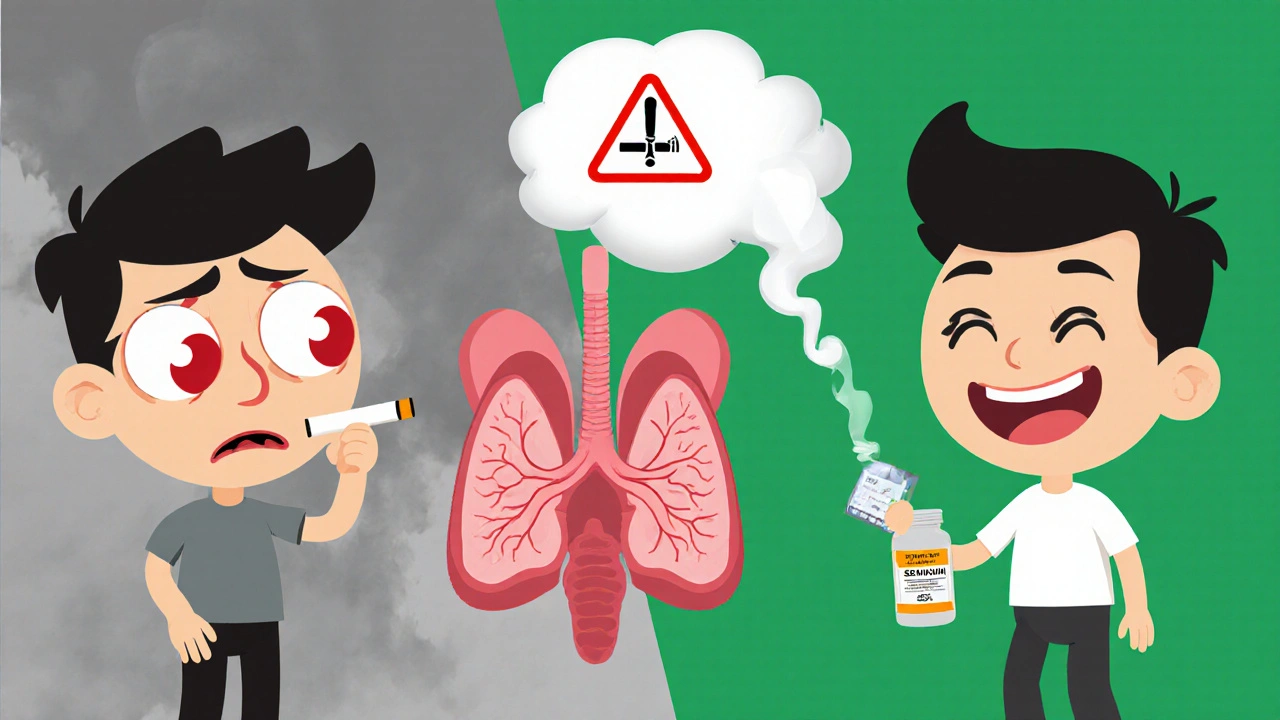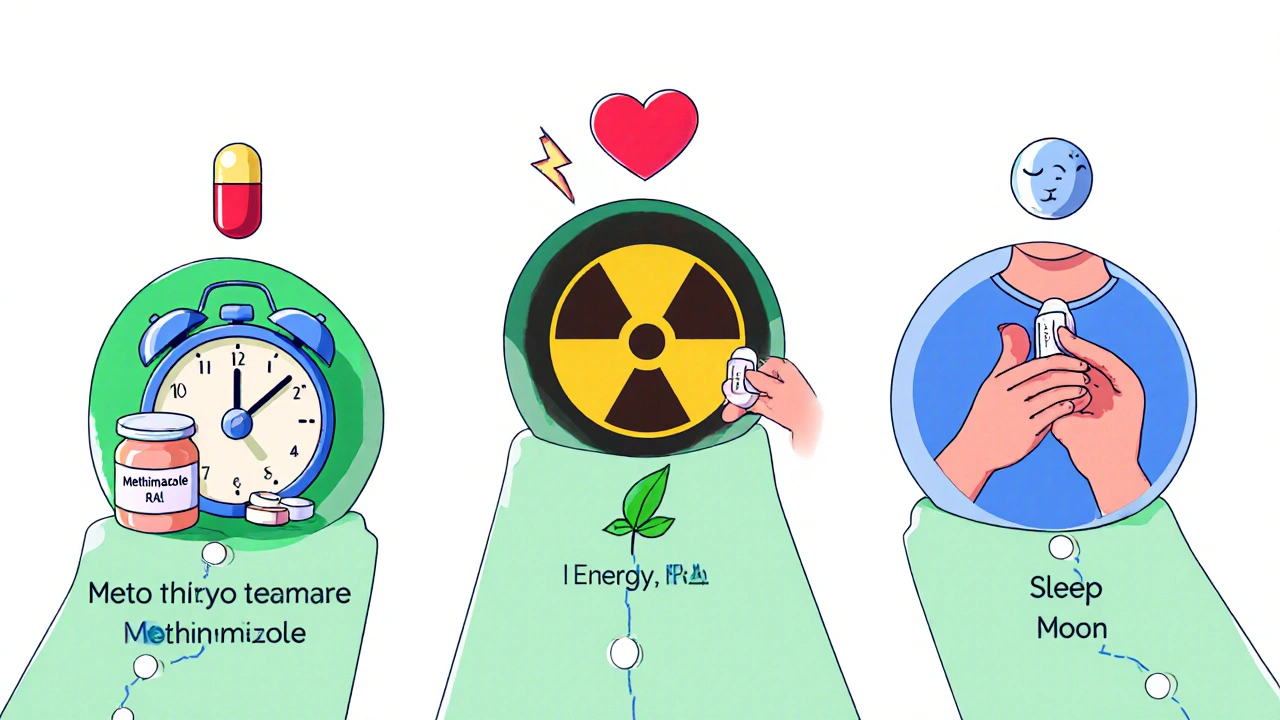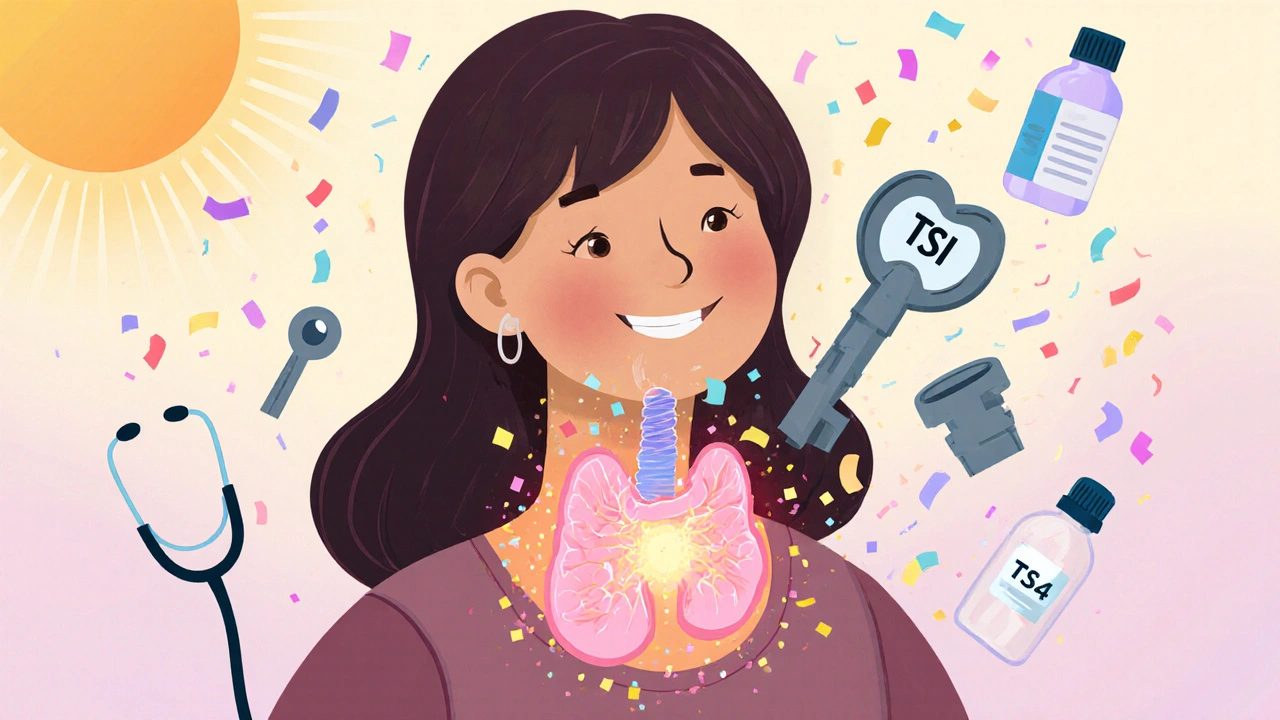Graves’ disease is the most common cause of hyperthyroidism in places where people get enough iodine in their diet. It’s not just an overactive thyroid - it’s your own immune system mistakenly attacking your thyroid gland, making it pump out too much hormone. This isn’t rare. About 1 in 50 people will develop it in their lifetime, and women are far more likely to be affected than men - up to 8 times more often. Most cases show up between ages 30 and 50, but it can strike at any age. If you’ve been feeling anxious, losing weight despite eating more, or your heart won’t stop racing, this could be why.
What Happens When Your Immune System Turns on Your Thyroid
In Graves’ disease, your body makes strange antibodies called thyroid-stimulating immunoglobulins (TSI). These act like fake keys that fit perfectly into the thyroid’s TSH receptors. Normally, TSH is the signal from your brain telling your thyroid, “Make more hormone.” But TSI doesn’t wait for that signal - it just keeps turning the thyroid on, nonstop. The result? Too much T3 and T4 flooding your bloodstream.
This isn’t just about energy levels. Every system in your body runs on thyroid hormones. When they’re out of control, you feel it everywhere. Younger people often notice anxiety, trouble sleeping, trembling hands, and a rapid heartbeat. Older adults might just feel weak, confused, or have chest pain - symptoms that get mistaken for aging or heart problems. The thyroid itself usually swells into a visible or palpable goiter, which doctors can feel during a physical exam.
Eye Problems Are a Major Red Flag
About 1 in 3 people with Graves’ disease develop eye issues, known as Graves’ ophthalmopathy. This isn’t just dry eyes. Your eyeballs can bulge forward (exophthalmos), making you look startled or even scared. You might feel grit in your eyes, see double, or have pain when you move them. In severe cases, vision can be threatened. Smoking makes this dramatically worse - smokers are 7 to 8 times more likely to develop serious eye complications than non-smokers. Quitting isn’t just good advice; it’s a medical necessity if you have Graves’.
For mild eye symptoms, selenium supplements (100 mcg twice a day for 6 months) can help reduce swelling and irritation. For moderate to severe cases, doctors now use intravenous steroids like methylprednisolone - a powerful anti-inflammatory given weekly for 6 to 12 weeks. A newer drug, teprotumumab, has shown amazing results in clinical trials, reducing eye bulging in 75-80% of patients. It’s not available everywhere yet, but it’s changing the game for those with stubborn eye disease.

How Doctors Diagnose It
Diagnosing Graves’ isn’t guesswork. It’s a clear three-step process. First, your doctor checks your thyroid hormone levels. If your TSH is below 0.4 and your free T4 is above 1.8, that’s a red flag. Most people with Graves’ also have high T3 levels. But that alone doesn’t prove it’s Graves’ - other conditions can cause the same numbers.
That’s where antibody testing comes in. If you test positive for TSH receptor antibodies (TRAb), you have Graves’ disease. This test is accurate in 90-95% of cases. If it’s not available, doctors may do a radioactive iodine uptake scan. In Graves’, the thyroid soaks up iodine like a sponge - it’s diffusely high, not patchy like in other thyroid disorders. Ultrasound can also help: high blood flow in the gland is a strong indicator.
Family history matters too. If someone in your family has Hashimoto’s, type 1 diabetes, or another autoimmune disease, your risk goes up. Stress, pregnancy, and smoking also play roles. A woman who develops symptoms after giving birth might be experiencing postpartum thyroiditis - which can look like Graves’ but often resolves on its own. That’s why antibody testing is key.
Three Main Treatment Paths - and What They Really Mean
There are three ways to treat Graves’ disease, and each comes with trade-offs. There’s no single “best” option - it depends on your age, symptoms, eye health, and personal preferences.
1. Antithyroid Medications
Methimazole is the first choice for most adults. It blocks the thyroid from making excess hormone. You start with 10 to 40 mg a day, and your doctor adjusts based on blood tests. Propylthiouracil is used less often because it carries a higher risk of liver damage. Both require monthly blood checks early on to watch for rare but serious side effects like agranulocytosis - a drop in white blood cells that can cause fever and sore throat. If you get these symptoms, stop the medicine and go to the ER immediately.
The goal is remission - stopping the meds and staying normal. About 30-50% of people achieve this after 12 to 18 months of treatment. You’re more likely to succeed if your goiter is small and your antibody levels drop to zero by the end of treatment. But if you miss doses, your relapse risk jumps by 40-50%. This isn’t a quick fix - it’s a long commitment.
2. Radioactive Iodine (RAI)
RAI is the most common treatment in the U.S. You swallow a capsule or liquid containing iodine-131. The thyroid absorbs it like regular iodine, but the radiation destroys the overactive cells. Within 6 to 12 months, most people become hypothyroid - meaning their thyroid stops working entirely. That’s not a failure. It’s the point. You’ll then take a daily levothyroxine pill for life to replace what your thyroid used to make.
RAI is simple, effective, and avoids surgery. But it’s permanent. About 80-90% of people end up needing thyroid hormone forever. Some patients regret this choice later, especially if they weren’t fully warned. It’s not recommended for pregnant women, and you’ll need to avoid close contact with others for a few days after treatment. Eye symptoms can sometimes get worse after RAI, so doctors often delay it if you have active eye disease.
3. Thyroid Surgery (Thyroidectomy)
Surgery is usually reserved for people with very large goiters that cause trouble swallowing or breathing, those who can’t take meds or RAI, or those with severe eye disease. The whole thyroid is removed. Success rate? Over 95%. But it’s not risk-free. There’s a 1-2% chance of damaging the parathyroid glands (which control calcium), and a 0.5-1% risk of injuring the nerve that controls your voice.
After surgery, you’ll need lifelong thyroid hormone replacement. But you won’t have to worry about relapse. For many, this is the most definitive solution.

What Life Is Like After Treatment
Once your hormone levels stabilize, most people feel dramatically better. On patient forums, 68% report major improvements in energy, mood, and sleep within 3 months of getting their dosage right. One person wrote: “After my methimazole dose was fixed at 15 mg, my heart palpitations vanished in two weeks.”
But managing Graves’ doesn’t end when the symptoms fade. You need regular blood tests - every 2-3 months after stabilization. If you had RAI or surgery, you’ll check your TSH and free T4 every 6-12 months for life. Missing a dose of levothyroxine can make you tired, gain weight, or feel depressed again.
Eye disease can linger even after the thyroid is under control. Some people need orbital decompression surgery years later to relieve pressure on the optic nerve. And if you smoke, quitting is non-negotiable. Studies show it’s the single biggest factor in preventing eye damage from getting worse.
What’s Coming Next
Research is moving fast. Scientists have found at least 12 genes linked to Graves’ disease, including HLA-DQA1 and CTLA4 - genes that control immune responses. This could one day lead to genetic risk screening.
Drugs like rituximab, which depletes B-cells (the immune cells that make the bad antibodies), are being tested for stubborn eye disease. Early results show about 60% of patients improve after 6 months. It’s not approved yet, but it’s promising.
For now, the tools we have work well - if you use them right. The key is early diagnosis, choosing the right treatment for your life, and sticking with follow-up care. Graves’ disease isn’t curable in the traditional sense, but it’s manageable. Most people go on to live full, active lives once their hormones are balanced.
Can Graves’ disease go away on its own?
Rarely. In about 30-50% of people who take antithyroid drugs for 12-18 months, the immune system stops attacking the thyroid, and symptoms don’t return. But without treatment, hyperthyroidism will keep getting worse. Left untreated, it can lead to heart problems, bone loss, or a life-threatening crisis called thyroid storm. Don’t wait for it to fix itself.
Is radioactive iodine safe?
Yes, for most people. Radioactive iodine has been used safely for over 70 years. The radiation dose is targeted only to the thyroid and doesn’t affect other organs. You’ll be advised to avoid close contact with others - especially pregnant women and young children - for a few days after treatment. The biggest risk is developing permanent hypothyroidism, which requires lifelong thyroid hormone replacement. That’s not a side effect - it’s the intended outcome.
Can I get pregnant if I have Graves’ disease?
Yes, but you need to plan carefully. Uncontrolled hyperthyroidism increases the risk of miscarriage, preterm birth, and low birth weight. If you’re on methimazole, your doctor will switch you to propylthiouracil during the first trimester because it crosses the placenta less. After delivery, your disease can flare up - especially if you’re breastfeeding. Always work with an endocrinologist before and during pregnancy.
Why do I still feel tired after starting treatment?
It takes time for your body to rebalance. Even after your hormone levels normalize, it can take weeks or months for your energy, mood, and sleep to return to normal. If you’re still tired after 3-4 months, your dose might need adjusting. Also, if you had RAI or surgery and are now hypothyroid, you may need more levothyroxine. Don’t assume fatigue is just part of the disease - talk to your doctor.
Are there natural remedies that work for Graves’ disease?
No. Supplements like selenium can help with mild eye symptoms, but nothing can stop the autoimmune attack on your thyroid. Avoid unproven diets, herbs, or detoxes - they won’t cure Graves’ and could interfere with your medications. The only proven treatments are antithyroid drugs, radioactive iodine, or surgery - all backed by decades of research.


Kartik Singhal
So let me get this straight - we’re giving people radioactive iodine like it’s a breakfast cereal? 🤔 And then acting surprised when they turn into walking zombie thyroid cases? I’ve seen this movie before. Big Pharma loves a lifelong pill habit. Also, why no mention of glyphosate? 🌱💥
November 22, 2025 AT 00:21
Chris Vere
The autoimmune mechanism described here is remarkably elegant in its biological precision. One must appreciate the evolutionary paradox: a system designed for defense becomes its own undoing. The persistence of TSI antibodies suggests a failure in central tolerance, perhaps rooted in molecular mimicry. A profound reminder of the body’s fragility.
November 22, 2025 AT 20:36
Pravin Manani
Fascinating breakdown, but let’s not overlook the HLA-DQA1 association - that’s a major genetic risk locus in Graves’ pathogenesis. Add in CTLA4 polymorphisms, and you’ve got a perfect storm of immune dysregulation. Also, the TSH-R antibody titers are predictive of remission post-methimazole. If you’re not monitoring TRAb at 12-18 months, you’re flying blind.
November 23, 2025 AT 12:15
Mark Kahn
Hey everyone - if you’re reading this and just got diagnosed, you’re not alone. Seriously. I was terrified too. But after 3 years on levothyroxine post-RAI, I’m hiking, lifting, and even dating again. It’s not the end - it’s a new beginning. Take it one day at a time 💪❤️
November 24, 2025 AT 12:46
Daisy L
I can’t believe people are still falling for this ‘natural remedies don’t work’ nonsense!! 😤 My cousin took turmeric, ashwagandha, and drank celery juice for 6 months - her TSH dropped to 1.2 and her eyes stopped bulging!! WHO’S LYING TO YOU?! Big Pharma doesn’t want you to know this!! 🚨🚫💊
November 25, 2025 AT 16:23
Anne Nylander
OMG i just found out i have graves and i was so scared but this post helped so much like i actually feel hopeful now!!! thank you so much!! i quit smoking yesterday and im gonna start selenium!! 🙏💛
November 27, 2025 AT 07:57
Noah Fitzsimmons
Oh wow, so the ‘solution’ is just to destroy your thyroid and call it a day? Brilliant. What’s next, amputate your foot because you stubbed your toe? You know what’s really ‘proven’? That doctors love to cut, burn, and poison before they bother to look at your gut, your stress levels, or your damn vitamin D.
November 28, 2025 AT 15:33
Clifford Temple
This is why America is falling apart. We let foreigners and ‘alternative medicine’ charlatans dictate our health. Radioactive iodine has been used for 70 years. It’s safe. It’s science. If you don’t trust it, move to a country that doesn’t believe in vaccines. We don’t need your pseudoscience here.
November 29, 2025 AT 16:31
Corra Hathaway
Y’all are so dramatic 😂 I had Graves’ and I just took methimazole for a year and now I’m chill as a cucumber. Also, I’m 32, female, and I ate keto and did yoga - guess what? My antibodies dropped. Maybe it’s not all about the meds? 🌈✨ #ThyroidTribe
November 30, 2025 AT 09:49